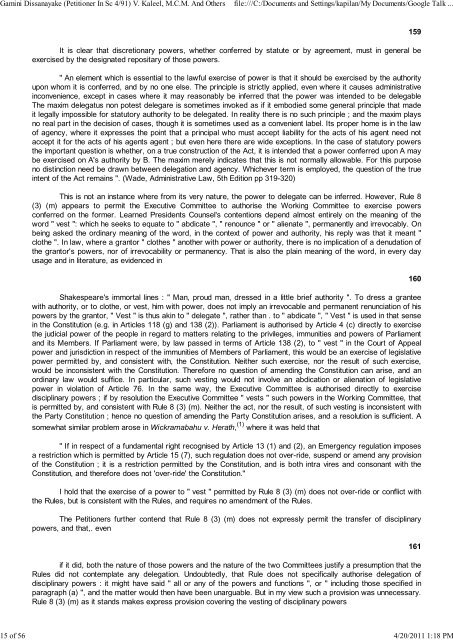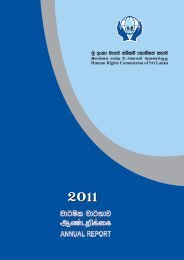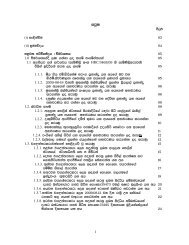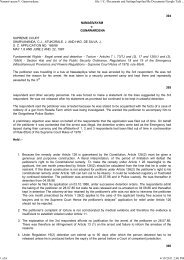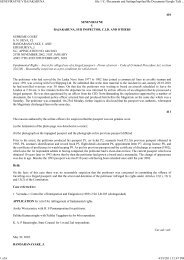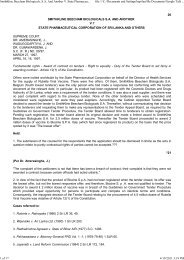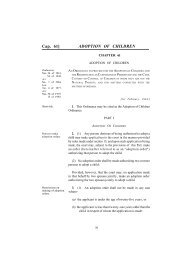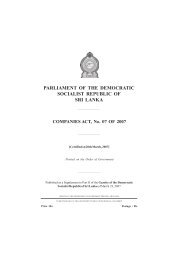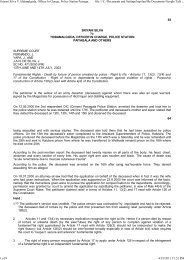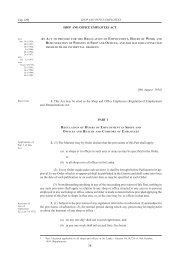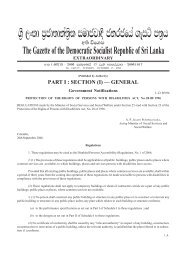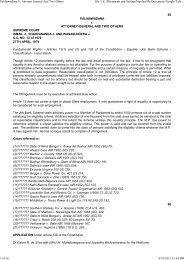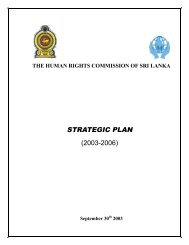Gamini Dissanayake (Petitio... - Human Rights Commission of Sri ...
Gamini Dissanayake (Petitio... - Human Rights Commission of Sri ...
Gamini Dissanayake (Petitio... - Human Rights Commission of Sri ...
You also want an ePaper? Increase the reach of your titles
YUMPU automatically turns print PDFs into web optimized ePapers that Google loves.
<strong>Gamini</strong> <strong>Dissanayake</strong> (<strong>Petitio</strong>ner In Sc 4/91) V. Kaleel, M.C.M. And Others file:///C:/Documents and Settings/kapilan/My Documents/Google Talk ...<br />
It is clear that discretionary powers, whether conferred by statute or by agreement, must in general be<br />
exercised by the designated repositary <strong>of</strong> those powers.<br />
" An element which is essential to the lawful exercise <strong>of</strong> power is that it should be exercised by the authority<br />
upon whom it is conferred, and by no one else. The principle is strictly applied, even where it causes administrative<br />
inconvenience, except in cases where it may reasonably be inferred that the power was intended to be delegable<br />
The maxim delegatus non potest delegare is sometimes invoked as if it embodied some general principle that made<br />
it legally impossible for statutory authority to be delegated. In reality there is no such principle ; and the maxim plays<br />
no real part in the decision <strong>of</strong> cases, though it is sometimes used as a convenient label. Its proper home is in the law<br />
<strong>of</strong> agency, where it expresses the point that a principal who must accept liability for the acts <strong>of</strong> his agent need not<br />
accept it for the acts <strong>of</strong> his agents agent ; but even here there are wide exceptions. In the case <strong>of</strong> statutory powers<br />
the important question is whether, on a true construction <strong>of</strong> the Act, it is intended that a power conferred upon A may<br />
be exercised on A's authority by B. The maxim merely indicates that this is not normally allowable. For this purpose<br />
no distinction need be drawn between delegation and agency. Whichever term is employed, the question <strong>of</strong> the true<br />
intent <strong>of</strong> the Act remains ". (Wade, Administrative Law, 5th Edition pp 319-320)<br />
This is not an instance where from its very nature, the power to delegate can be inferred. However, Rule 8<br />
(3) (m) appears to permit the Executive Committee to authorise the Working Committee to exercise powers<br />
conferred on the former. Learned Presidents Counsel's contentions depend almost entirely on the meaning <strong>of</strong> the<br />
word " vest ": which he seeks to equate to " abdicate ", " renounce " or " alienate ", permanently and irrevocably. On<br />
being asked the ordinary meaning <strong>of</strong> the word, in the context <strong>of</strong> power and authority, his reply was that it meant "<br />
clothe ". In law, where a grantor " clothes " another with power or authority, there is no implication <strong>of</strong> a denudation <strong>of</strong><br />
the grantor's powers, nor <strong>of</strong> irrevocability or permanency. That is also the plain meaning <strong>of</strong> the word, in every day<br />
usage and in literature, as evidenced in<br />
Shakespeare's immortal lines : " Man, proud man, dressed in a little brief authority ". To dress a grantee<br />
with authority, or to clothe, or vest, him with power, does not imply an irrevocable and permanent renunciation <strong>of</strong> his<br />
powers by the grantor, " Vest " is thus akin to " delegate ", rather than . to " abdicate ", " Vest " is used in that sense<br />
in the Constitution (e.g. in Articles 118 (g) and 138 (2)). Parliament is authorised by Article 4 (c) directly to exercise<br />
the judicial power <strong>of</strong> the people in regard to matters relating to the privileges, immunities and powers <strong>of</strong> Parliament<br />
and its Members. If Parliament were, by law passed in terms <strong>of</strong> Article 138 (2), to " vest " in the Court <strong>of</strong> Appeal<br />
power and jurisdiction in respect <strong>of</strong> the immunities <strong>of</strong> Members <strong>of</strong> Parliament, this would be an exercise <strong>of</strong> legislative<br />
power permitted by, and consistent with, the Constitution. Neither such exercise, nor the result <strong>of</strong> such exercise,<br />
would be inconsistent with the Constitution. Therefore no question <strong>of</strong> amending the Constitution can arise, and an<br />
ordinary law would suffice. In particular, such vesting would not involve an abdication or alienation <strong>of</strong> legislative<br />
power in violation <strong>of</strong> Article 76. In the same way, the Executive Committee is authorised directly to exercise<br />
disciplinary powers ; if by resolution the Executive Committee " vests " such powers in the Working Committee, that<br />
is permitted by, and consistent with Rule 8 (3) (m). Neither the act, nor the result, <strong>of</strong> such vesting is inconsistent with<br />
the Party Constitution ; hence no question <strong>of</strong> amending the Party Constitution arises, and a resolution is sufficient. A<br />
somewhat similar problem arose in Wickramabahu v. Herath, (1) where it was held that<br />
" If in respect <strong>of</strong> a fundamental right recognised by Article 13 (1) and (2), an Emergency regulation imposes<br />
a restriction which is permitted by Article 15 (7), such regulation does not over-ride, suspend or amend any provision<br />
<strong>of</strong> the Constitution ; it is a restriction permitted by the Constitution, and is both intra vires and consonant with the<br />
Constitution, and therefore does not 'over-ride' the Constitution."<br />
I hold that the exercise <strong>of</strong> a power to " vest " permitted by Rule 8 (3) (m) does not over-ride or conflict with<br />
the Rules, but is consistent with the Rules, and requires no amendment <strong>of</strong> the Rules.<br />
The <strong>Petitio</strong>ners further contend that Rule 8 (3) (m) does not expressly permit the transfer <strong>of</strong> disciplinary<br />
powers, and that,. even<br />
if it did, both the nature <strong>of</strong> those powers and the nature <strong>of</strong> the two Committees justify a presumption that the<br />
Rules did not contemplate any delegation. Undoubtedly, that Rule does not specifically authorise delegation <strong>of</strong><br />
disciplinary powers : it might have said " all or any <strong>of</strong> the powers and functions ", or " including those specified in<br />
paragraph (a) ", and the matter would then have been unarguable. But in my view such a provision was unnecessary.<br />
Rule 8 (3) (m) as it stands makes express provision covering the vesting <strong>of</strong> disciplinary powers<br />
15 <strong>of</strong> 56 4/20/2011 1:18 PM<br />
159<br />
160<br />
161


